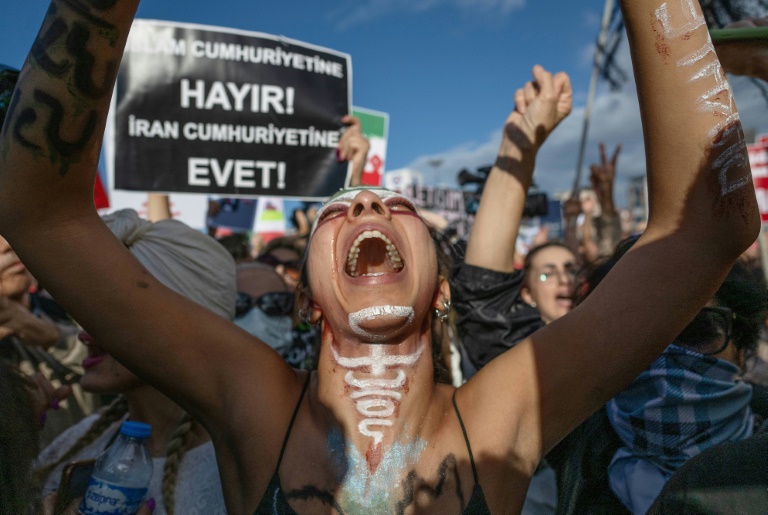‘Beginning of the end’: Iran activists call for new protests

A woman shouts at a solidarity rally in Istanbul
Paris – Iranian activists called for fresh nationwide protests over the death of Mahsa Amini, as the movement entered a fifth week on Friday despite a crackdown that has killed dozens.
Outrage over the 22-year-old’s death on September 16, three days after she was arrested by Iran’s notorious morality police, has fuelled the biggest wave of street protests and violence seen in the country for years.
Young women have been on the front line of the protests, shouting anti-government slogans, removing their headscarves and facing off with security forces in the streets.
At least 108 people have been killed in the Amini protests, and at least another 93 have died in separate clashes in Zahedan, a city in the southeastern province of Sistan-Baluchestan, says the Oslo-based group Iran Human Rights.
The protests have continued despite what Amnesty International called an “unrelenting brutal crackdown” that included an “all-out attack on child protesters” — leading to the deaths of at least 23 minors.
There were fewer reports of people taking to the streets over Amini’s death on Friday, but hundreds of men were seen protesting after weekly prayers in Zahedan, in online videos verified by AFP.
Despite blocked access to internet services and platforms like Instagram and WhatsApp, activists issued an online appeal for a huge turnout on Saturday for Amini protests under the catchcry “The beginning of the end!”.
They have called on youths and people in Tehran and across Iran to show up at spots where the security forces are not present and to chant “Death to the dictator”.
“We have to be present in the squares, because the best VPN these days is the street,” they declared, referring to virtual private networks used to skirt internet restrictions.
– International condemnation –
The bloody crackdown has drawn international condemnation and new sanctions on Iran from Britain, Canada and the United States.
Iran’s supreme leader Ayatollah Ali Khamenei has also accused the Islamic republic’s arch-foes the United States and Israel of fomenting the “riots”.
On Friday, his government condemned French President Emmanuel Macron for remarks in which he expressed solidarity with the protests sparked over Amini’s death.
Foreign ministry spokesman Nasser Kanani said Macron’s remarks were “meddlesome” and served to encourage “violent people and law breakers”.
Kanani said it was “surprising” that Paris was condemning Iran’s security forces for dealing with “violent people and rioters” while it was threatening to use force in response to “labour strikes in the oil and gas sector” in France.
“This is clear hypocrisy,” he added.
The Amini protests have seen youths joining in and adopting surprise tactics to avoid detection.
Young women, university students and schoolgirls have been seen staging pop-up or flash-mob protests to avoid detection, as seen in video footage posted online.
– Guards ‘retirees’ get call-up –
Analysts say the multi-faceted nature of the Amini protests has complicated state attempts to quell them, which could spell an even bigger challenge to the authorities than 2019 demonstrations over a sudden fuel price hike.
The approach has reportedly forced security personnel to move around a lot and caused them to grow tired, as the protests look set to extend into a second month.
This week, a call went out to “retirees” of the Islamic Revolutionary Guard Corps for them to gather on Saturday given “the current sensitive situation”, according to a journalist at Shargh newspaper.
In response to the protests, the security forces have carried out a campaign of mass arrests that has netted young activists, journalists, students and even underage children.
Schoolchildren have been arrested inside classrooms and ended up in “psychological centres”, Iran’s Education Minister Yousef Nouri said this week, quoted by Shargh.
Rare voices of support for them have come from inside the country.
In an open letter published on its front page on Thursday, reformist newspaper Etemad called on Iran’s top security official, Ali Shamkhani, to stop arrests being made under “pretences that are sometimes false”.
The Iranian authorities have organised their own rallies attended by women clad in black chadors, garments that cover their heads and bodies.
A bid to show they had the support of famous women unravelled overnight, after a photomontage of dozens of them observing hijab disappeared from a Tehran billboard within 24 hours of being erected as it featured some personalities known to oppose the headscarf rule.
